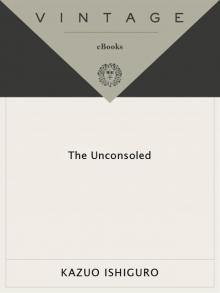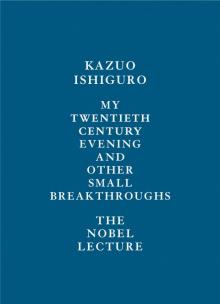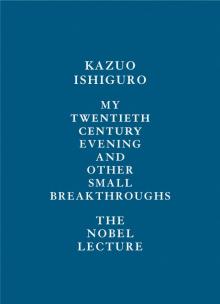- Home
- Kazuo Ishiguro
A Pale View of Hills Page 5
A Pale View of Hills Read online
Page 5
“And what are you doing with yourself these days, dear?” she asked Niki.
“Me? Oh, I live in London”
“Oh yes? And what are you doing there? Studying?”
”I’m not doing anything really. I just live there.”
“Oh, I see. But you’re happy there, are you? That’s the main thing, isn’t it.”
“Yes, I’m happy enough.”
“Well, that’s the main thing, isn’t it. And what about Keiko?” Mrs. Waters turned to me. “How is Keiko getting on now?”
“Keiko? Oh, she went to live in Manchester.”
“Oh yes? That’s a nice city on the whole. That’s what I’ve heard anyway. And does she like it up there?”
“I haven’t heard from her recently.”
“Oh well. No news is good news, I expect. And does Keiko still play the piano?”
“I expect she does. I haven’t heard from her recently.”
My lack of enthusiasm seemed finally to penetrate, and she dropped the subject with an awkward laugh. Such persistence on her part has characterized our encounters over the years since Keiko’s leaving home. Neither my evident reluctance to discuss Keiko nor the fact that until that afternoon I had been unable to tell her so much as my daughter’s whereabouts had succeeded in making any lasting impression upon her. In all probability, Mrs. Waters will continue to ask cheerfully after my daughter whenever we happen to meet.
By the time we got home, the rain was falling steadily.
“I suppose I embarrassed you, didn’t I?” Niki said to me. We were sitting once again in our armchairs, looking out into the garden.
“Why do you suppose that?” I said.
“I should have told her I was thinking of going to university or something like that.”
“I don’t mind in the least what you say about yourself. I’m not ashamed of you.”
“No, I suppose not."
“But I did think you were rather off-hand with her. You never did like that woman much, did you?”
“Mrs. Waters? Well, I used to hate those lessons she gave me. They were sheer boredom. I used to lust go off in a dream, then now and again there’d be this little voice telling me to put my finger here or here or here. Was that your idea, getting me to have lessons?”
“It was mainly mine. You see, I had great plans for you once.”
Niki laughed. “I’m sorry to be such a failure. But it’s your own fault. I haven’t got any musical sense at all. There’s this girl in our house who plays the guitar, and she was trying to show me some chords, but I couldn’t be bothered to even learn those. I think Mrs. Waters put me off music for life.”
“You may come back to it some time and you’ll appreciate having had lessons.”
“But I’ve forgotten everything lever learnt."
“I doubt if you would have forgotten everything. Nothing you learn at that age is totally lost.”
“A waste of time, anyway,” Niki muttered. She sat looking out of the windows for some time. Then she turned to me and said: “I suppose it must be quite difficult to tell people. About Keiko, I mean."
“It seemed easiest to say what I did,” I replied. “She rather took me by surprise."
“Yes, I suppose so." Niki went on looking out of the window with an empty expression. “Keiko didn’t come to Dad’s funeral, did she?” she said, eventually.
“You know perfectly well she didn’t so why ask?”
“I was just saying, that’s all.”
“You mean you didn’t come to her funeral because she didn’t come to your father’s? Don’t be so childish, Niki.”
“I’m not being childish. I’m just saying that’s the way it was. She was never a part of our lives—not mine or Dad’s anyway. I never expected her to be at Dad’s funeral."
I did not reply and we sat silently in our armchairs. Then Niki said: “It was odd just now, with Mrs. Waters. It was almost like you enjoyed it.”
“Enjoyed what?”
“Pretending Keiko was alive;"
“I don’t enjoy deceiving people.” Perhaps I snapped a little, for Niki looked startled.
“No, I suppose not,” she said, lamely.
It rained throughout that night, and the next day—the fourth day of Nik’s stay—it was still raining steadily.
“Do you mind if I change moms tonight?” Niki said. “I could use the spare bedroom. We were in the kitchen, washing the dishes after breakfast.
“The spare bedroom?” I laughed a little. “They’re all spare bedrooms now. No, there’s no reason why you shouldn’t sleep in the spare room. Have you taken a dislike to your old mom?”
“I feel a bit odd sleeping there."
“How unkind, Niki. I hoped you’d still feel it was your room.”
“Yes, I do,” she said, hurriedly. “Its not that I don’t like it.” She fell silent, wiping some knives with a tea-towel. Finally she said: “It’s that other room. Her room. It gives me an odd feeling, that room being right opposite.”
I stopped what I was doing and looked at her sternly.
“Well, I can’t help it, Mother. I just feel strange thinking about that room being right opposite.”
“Take the spare room by all means,” I said, coldly. “But you’ll need to make up the bed in there.”
Although I had made a show of being upset by Niki’s request to change rooms, I had no wish to make it difficult for her to do so. For I too had experienced a disturbing feeling about room opposite. In many ways, that room is the most pleasant in the house, with a splendid view across the orchard. But it had been Keiko’s fanatically guarded domain for so long, a strange spell seemed to linger there even now, six years after she had left it—a spell that had grown all the stronger now that Keiko was dead.
For the two or three ears before she finally left us, Keiko had retreated into t bedroom, shutting us out of her life. She rarely came out, although I would sometimes hear her moving around the house after we had all gone to bed. I surmised that she spent her time reading magazines and listening to her radio. She had no friends, and the rest of us were forbidden entry into her room. At mealtimes I would leave her plate in the kitchen and she would come down to get it, then shut herself in again. The room, I realized, was in a terrible condition. An odour of stale perfume and dirty linen came from within, and on the occasions .I had glimpsed inside, I had seen countless glossy magazines lying on the floor amidst heaps of clothes. I had to coax her to put out her laundry, and in this at least we reached an understanding: every few weeks I would find a bag of washing outside her door, which I would wash and return. In the end, the rest of us grew used to her ways, and when by some impulse Keiko ventured down into our living room, we would all feel a great tension. Invariably, these excursions would end with her fighting, with Niki or with my husband, and then she would be back in her room.
I never saw Keiko’s room in Manchester, the room in which she died. It may seem morbid of a mother to have such thoughts, but on hearing of her suicide, the first thought that ran through my mind—before I registered even the shock— was to wonder how long she had been there like that before they had found her. She had lived amidst her own family without being seen for days on end; little hope she would be discovered quickly in a strange city where no one knew her. Later, the coroner said she had been there ”for several days”. It was the landlady who had opened the door, thinking Keiko had left without paying the rent.
I have found myself continually bringing to mind that picture — of my daughter hanging in her room for days on end. The horror of that image has never diminished, but it has-long ceased to be a morbid matter; as with a wound on one’s own body, it is possible to develop an intimacy with the most disturbing of things.
“I’ll probably be warmer in the spare room anyhow,” Niki said.
“If you’re cold at night, Niki, you can simply turn up the heating.”
“I suppose so.” She gave a sigh. “I haven’t slept very well lately. I
think I’m getting bad dreams, but I can never remember them properly once I wake up.”
“I had a dream last night,” I said.
“I think it might be to do with the quiet. I’m not used to it being so quiet at night.”
“I dreamt about that little girl. The one we were watching yesterday. The little girl in the park.”
“I can sleep right through traffic, but I’ve forgotten what it’s like, sleeping in the quiet.” Niki shrugged and dropped some cutlery into the drawer. “Perhaps I’ll sleep better in the spare room.”
The fact that I mentioned my dream to Niki, that first time I had it, indicates perhaps that I had doubts even then as to its innocence. I must have suspected from the start — without fully knowing why — that the dream had to do not so much with the little girl we had watched, but with my having remembered Sachiko two days previously.
Chapter Four
I was in the kitchen one afternoon preparing the supper before my husband came home from work, when I heard a strange Sound coming from the living room. Estopped what I was doing and listened. It came again—the Sound of a violin being played very badly. The noises continued for a few minutes then stopped.
When eventually I went into the living room, I found Ogata-San bowed over a chess-board. The late afternoon sun was streaming in and despite the electric fans a humidity had set in all around the apartment. I opened the windows a little wider.
“Didn’t you finish your game last night?" I asked, coming over to him.
“No, Jiro claimed he was too tired. A ploy on his part, I suspect. You see, I have him in a nice corner here."
“I see."
“He’s relying on the fact that my memory’s so foggy these days. So I’m just going over my strategy again.”
“How resourceful of you, Father. But I doubt if Jiro’s mind works quite so cunningly.”
“Perhaps not. I dare say you know him better than I do these days.” Ogata-San continued to study the board for several moments, then looked up and laughed. “This must seem amusing to you. Jim sweating away in his office and here I am preparing a game of chess for when he comes home. I feel like a small child waiting for his father.”
“Well, I’d much rather you occupied yourself with chess. Your musical recital earlier was hideous.”
“How disrespectful. And I thought you’d be moved, Etsuko.”
The violin was on the floor nearby, put back in its case. Ogata-San watched me as I began opening the case.
“I noticed it up there on the shelf,” he said “I took the liberty of bringing it down. Don’t look so concerned, Etsuko. I was very gentle with it.”
“I can’t be sure. As you say, Father’s like a child these days.” I held up the violin and examined it. “Except small children can’t reach up to high shelves.”
I tucked the instrument under my chin. Ogata-San continued to watch me.
“Play something for me," he said. “I’m sure you can do better than me.”
“I’m sure I can.” Once morel held the violin out at arm’s length. “But it’s been such a long time.”
“You mean you haven’t been practicing? Now that’s a pity, Etsuko. You used to be so devoted to the instrument.”
“I suppose I was once. But I hardly touch it now.”
“A great shame, Etsuko. And you were so devoted. I remember when you used to play in the dead of night and wake up the house.”
“Wake up the house? When did I do that?”
“Yes, I remember. When you first came to stay with us.” Ogata-San gave a laugh. “Don’t look so worried, Etsuko. We all forgave you. Now let me see, who was the composer you used to admire so much? Was it Mendelssohn?”
“Is that true? I woke up the house?”
“Don’t look so worried, Etsuko. It was years ago. Play me something by Mendelssohn.”
“But why didn’t you stop me?”
“It was only for the first few nights. And besides, we didn’t mind in the least.”
I plucked the strings lightly. The violin was out of tune. “I must have been such a burden to you in those days,” I said, quietly
“Nonsense.”
“But the rest of the family. They must have thought I was a mad girl.”
“They couldn’t have thought too badly of you. After all, it ended up with you marrying Jim. Now come on, Etsuko, enough of this. Play me something.”
“What was I like in those days, Father? Was I like a mad person?”
“You were very shocked, which was only to be expected. We were all shocked those of us who were left,. Now, Etsuko, let’s forget these things. I’m sorry I ever brought up the matter.”
I brought the instrument up to my chin once more.
“Ah,” he said, “Mendelssohn.”
I remained like that for several seconds, the violin under my chin. Then! brought it down to my lap and sighed. “I hardly play it now,”! said.
“I’m sorry, Etsuko.” Ogata-San’s voice had become solemn. “Perhaps I shouldn’t have touched it.”
I looked up at him and smiled. “So,” I said, “the little child is feeling guilty now.”
“It’s just that! saw it up there and I remembered it from those days.”
“I’ll play it for you another time. After I’ve practiced a little."
He gave me a small bow, and the smile returned to his eyes.
“I’ll remember you promised, Etsuko. And perhaps you could teach me a little.”
“I can’t teach you everything, Father. You said you wanted to learn to cook."
“Ah yes. That too.”
“I’ll play for you the next time you come to stay with us.”
“I’ll remember you promised,” he said.
After supper that evening, Jiro and his father settled down to their game of chess. I cleared up the supper things and then sat down with some sewing. At one point during their game, Ogata-San said:
“I’ve just noticed something. If you don’t mind, I’d like to make that move again.”
“Certainly,” said Jim.
“But then it’s rather unfair on you. Especially since I seem to have the better of you at the moment."
“No, not at all. Please take the move again."
“You don’t mind?”
“Not at all.”
They played on in silence.
“Jiro,” Ogata-San said after several minutes, “I was just wondering. Have you written that letter yet? To Shigeo Matsuda?”
I looked up from my sewing. Jiro appeared absorbed in the game and did not reply until he had moved his piece. “Shigeo? Well, not yet. I’ve been meaning to. But I’ve been so busy just recently.”
“Of course. I quite understand. I lust happened to think of it, that’s all."
“I don’t seem to have had much time just recently.”
“Of course. There’s no hurry. I don’t mean to keep pestering you like this. It’s just that it might be more appropriate if he heard from you fairly soon. Its a few weeks now since his article appeared.”
“Yes, certainly. You’re quite right.”
They returned to their game. For some moments neither of them spoke. Then Ogata-San said:
“How do you suppose he’ll react?”
“Shigeo? I don’t know. As I say, I don’t know him very well these days.”
“He’s joined the Communist Party, you say?”
“I’m not certain. He certainly expressed such sympathies when I last saw him.”
“A great pity. But then there are so many things in Japan today to sway a young man.”
“Yes, no doubt.”
“So many young men these days get carried away with ideas and theories. But perhaps he’ll back down and apologize. There’s nothing like a timely reminder of one’s personal obligations. You know, I suspect Shigeo never even stopped to consider what he was doing. I think he wrote that article with a pen in one hand and his books about communism in the other. He may well back down in the
end."
“Quite possibly. I’ve just had so much work recently.”
“Of course, of course. Your work must take precedence. Please don’t worry about it. Now, was it my move?”
They continued their game, speaking little. Once I heard Ogata-San say: “You’re moving just as I anticipated. You’ll need to be very clever to escape from that corner.”
They had been playing for sometime when there was a knock at the door. Jiro looked up and threw me a glance. I put down my sewing and got to my feet.
When I opened the door, I found two men grinning and bowing at me. It was quite late by then and I thought at first they had come to the wrong apartment. But then I recognized them as two of Jiro’s colleagues and asked them in. They stood in the entryway giggling to themselves. One was a tubby little man whose face looked quite flushed. His companion was thinner, with a pale complexion like that of a European; but it seemed he too had been drinking, for pink blotches had appeared on each of his cheeks. They were both wearing ties, loosened untidily, and were holding jackets over their arms.
Jiro seemed pleased to see them and called to them to sit down. But they remained in the entryway, giggling.
“Ah Ogata,” the pale-faced man said to Jim, “perhaps we’ve caught you at a bad time.”
“Not at all. What are you doing in these parts anyway?”
“We’ve been to see Murasaki’s brother. In fact, we haven’t been home yet.”
“We came to disturb you because we’re afraid to go home,” the tubby man put in. “We didn’t tell our wives we’d be late.”
“What rabble you are, the pair of you, said Jiro. “Why don’t you take off your shoes and come up here?
“We’ve caught you at a bad time,’ the pale-faced man said again. “I can see you’ve got a visitor.” He grinned and bowed towards Ogata-San.
“This is my father, but how can I introduce you if you don’t come in?”
The visitors finally took off their shoes and seated themselves. Jim introduced them to his father and they began once more to bow and giggle.
“You gentlemen are from Jim’s firm?” Ogata-San asked.

 The Buried Giant
The Buried Giant Never Let Me Go
Never Let Me Go The Unconsoled
The Unconsoled My Twentieth Century Evening and Other Small Breakthroughs: The Nobel Lecture
My Twentieth Century Evening and Other Small Breakthroughs: The Nobel Lecture An Artist of the Floating World
An Artist of the Floating World The Remains of the Day
The Remains of the Day A Pale View of Hills
A Pale View of Hills Nocturnes: Five Stories of Music and Nightfall
Nocturnes: Five Stories of Music and Nightfall When We Were Orphans
When We Were Orphans Klara and the Sun
Klara and the Sun The Nobel Lecture 2017
The Nobel Lecture 2017